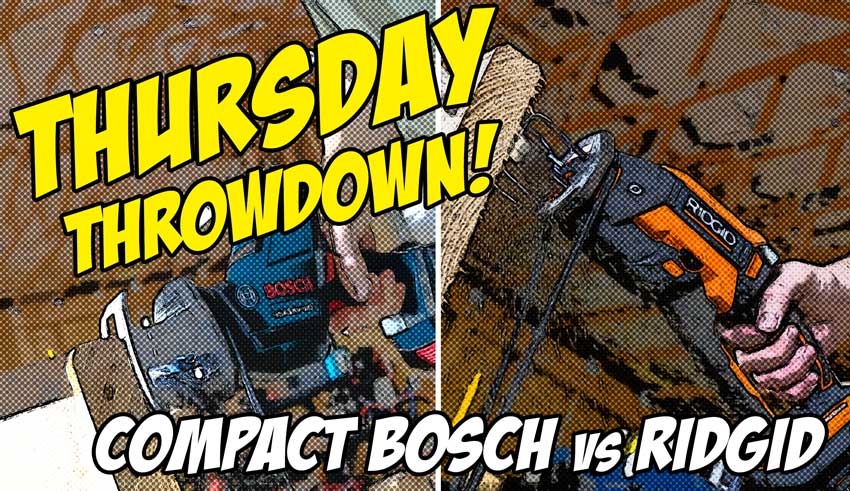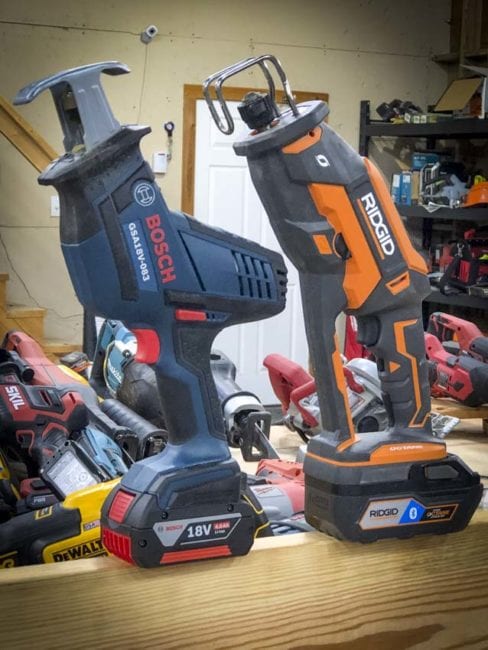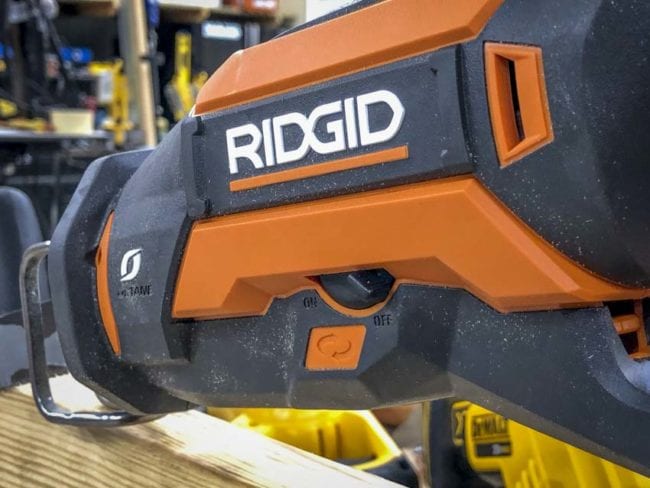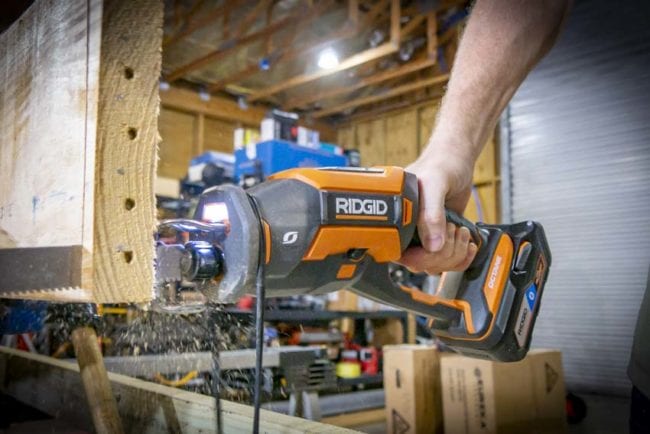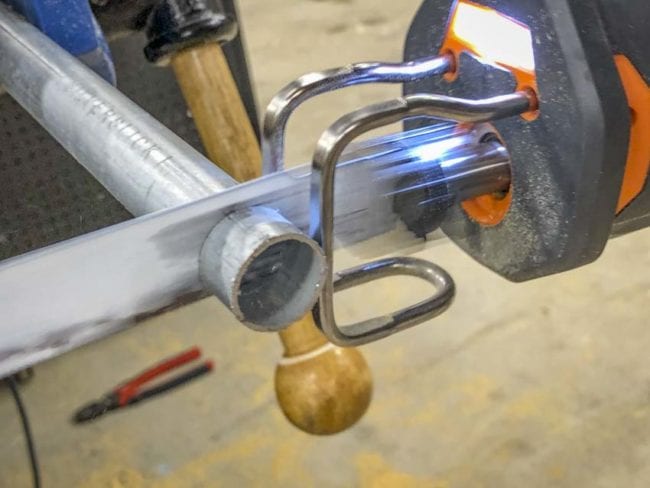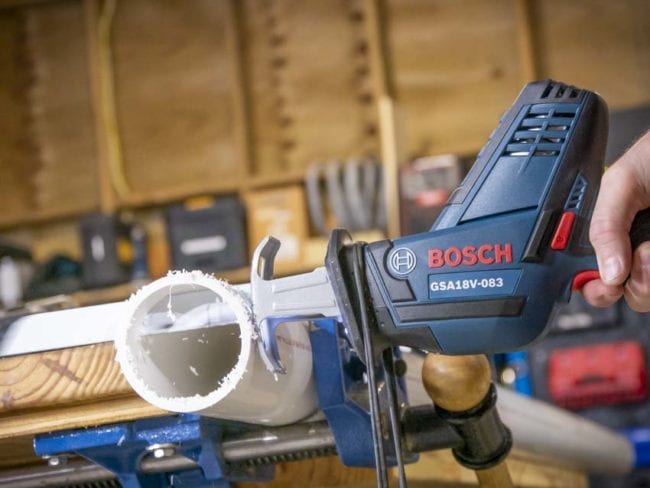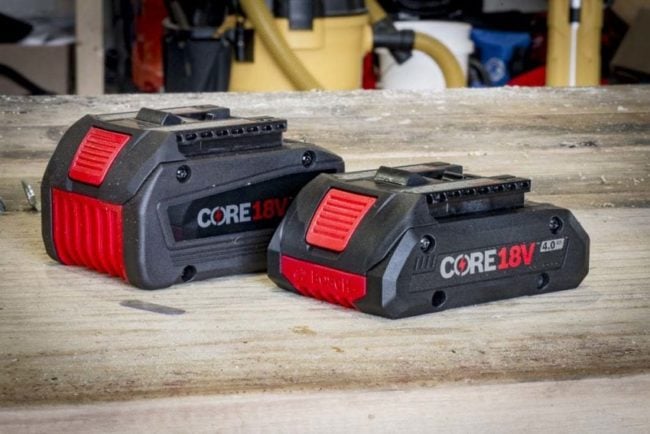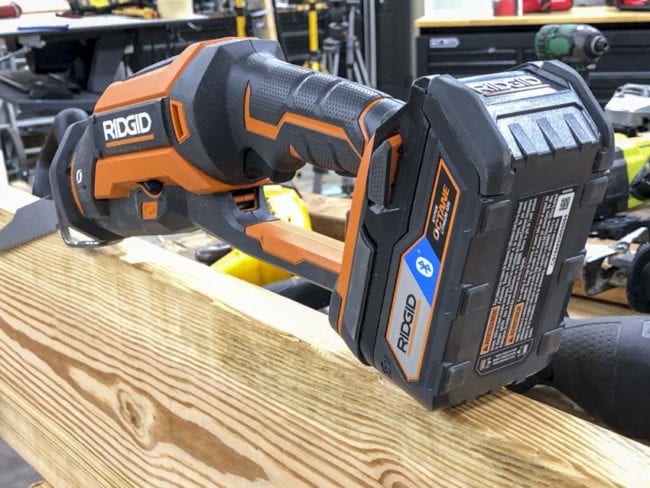Within the compact reciprocating saw realm, there are two distinct classes—one-hand and two-hand models. It may not seem like a big deal at first glance, but there are pretty big differences in performance. For this Thursday Throwdown, we’re looking at the one-hand class. It’s Bosch vs Ridgid compact reciprocating saw in a one vs one fight to the finish!
This is a bit different from our normal shootouts. We’re going to go point by point and declare a winner at the end. You may prioritize some of these areas more than others, so it’s entirely possible that the best saw for you is different than what the final score indicates. And that’s okay!
Feel free to tell us what you think in the comments below. Just keep in mind that even though we have hundreds of hours invested in our testing, we can’t possibly hit every single scenario.
Bosch Vs Ridgid Compact Reciprocating Saw
Here are our two competitors for today’s matchup:
Bosch 18V Compact Reciprocating Saw GSA18V-083B
- Tested Battery: Bosch 4.0Ah
- Motor: Brushed
- Stroke Length: 13/16″
- Stroke Speed: 0 – 3050 SPM
Read our review here.
Ridgid 18V Octane One-Handed Reciprocating Saw R86448
- Tested Battery: Ridgid 18V Octane 3.0Ah
- Motor: Brushless
- Stroke Length: 3/4″
- Stroke Speed: 0 – 3000 SPM
Be on the lookout for our standalone review soon!
Size
As compact reciprocating saws, smaller size is preferable. Bosch comes in at 14.3″ while Ridgid is a little longer at 15″. That’s close enough that it might not make a huge difference, but Bosch clearly has the advantage.
Verdict: Bosch
Weight
Without batteries, Bosch is a little lighter—4.3 pounds compared to 4.6 pounds. The difference might be Ridgid’s additional handguard material. Depending on how and what you’re cutting, it’s easy to see how Ridgid might save you some knuckle-busting.
With the batteries we tested (4.0Ah for Bosch and 3.0Ah Octane for Ridgid), Bosch gains 1.3 pounds (5.7 total) and Ridgid picks up another 1.8 pounds (6.4 total). Bosch is the clear winner here.
Verdict: Bosch
Feature Set
When it comes to features, here’s what we look for:
| Bosch GSA18V-083B | Ridgid R86448 | |
| Brushless Motor | No | Yes |
| Orbital Action | No | Yes |
| Variable Speed Dial | No | No |
| Tool-Free Adjustable Shoe | No | No |
| Pivoting Shoe | No | No |
| Blade Release | Shaft Lock | Shaft Lock |
| LED Light | Yes | Yes |
| Spring Blade Ejection | No | No |
Ridgid has a big advantage thanks to its brushless motor and orbital action. We expect both of those features to play a role in cutting performance as well.
Verdict: Ridgid
Nail-Embedded Wood Cutting
Cutting wood typically isn’t a primary focus for one-handed reciprocating saws. However, Ridgid’s inclusion of orbital action tells us that they’re not ruling it out. It’s a difference that shows.
Cutting through 2 x 10 pressure-treated pine with five 16D nails in it, Bosch needs an average of 43.41 seconds to cut through. With orbital action engaged, Ridgid needs 23.41 seconds—a massive 46% faster!
Verdict: Ridgid
Metal Cutting
We used 3/4″ EMT to see how fast each saw can cut through thin metal. Sure, we could cut rebar and test thick metal, but it’s not an application we see one-handed saws used on.
In this test, Bosch averages an impressive 2.41 seconds per cut. That’s the second-fastest time we saw. Unfortunately for Bosch, Ridgid had the fastest cut time with a 1.89-second average. While most people aren’t likely to complain about a 1/2-second difference, Ridgid is the winner.
Verdict: Ridgid
PVC Cutting
Switching over to 3″ PVC, the results are very similar. Bosch makes an impressive run to the second-fastest average (5.21 seconds) only to be outpaced by Ridgid at 4.50 seconds.
Verdict: Ridgid
Vibration
For our vibration testing, we had a team of three PTR staff members independently score both saws on a 1 – 4 scale. We cut wood, metal, and PVC, focusing on how much vibration transferred to our hands.
Once the results were in, we tallied them up and averaged them out to get a final score. Bosch finished with a vibration control score of 87, easily gapping Ridgid with a score of 67.
Verdict: Bosch
Available Batteries
Bosch 18V compact reciprocating saw can use any of Bosch’s 18V batteries, including the Core18V packs. There’s a little bit of a boost that comes from using Core18V, but not as big as the tools designed around that battery system.
On the other hand, Ridgid’s Octane one-hand reciprocating saw is designed to take advantage of Ridgid’s Octane advanced batteries. You can still use their standard packs, but there’s going to be a bit of performance drop.
Bosch 18V Compact Reciprocating Saw Compatible Batteries
- 2.0Ah
- 2.0Ah Wireless Charging
- 4.0Ah
- 4.0Ah Wireless Charging
- 6.0Ah
- 4.0Ah Core18V
- 6.3Ah Core18V
- 8.0Ah Core18V
- 12.0Ah Core18V (new!)
Ridgid 18V Octane One-Handed Reciprocating Saw Compatible Batteries
- 1.5Ah
- 2.0Ah
- 4.0Ah
- 5.0Ah
- 3.0Ah Octane
- 6.0Ah Octane
- 9.0Ah Octane
Both brands offer a nice mix of standard and advanced batteries from 1P slim packs to 3P high-capacity. Bosch has the advantage here with a new 12.0Ah Core18V battery and a couple of wireless charging options.
Verdict: Bosch
Compatible Tools
When it comes to compatible tools, there’s no contest. Bosch has a much deeper lineup of 18V tools than Ridgid does, though Ridgid does hit all the basics of what general contractors need.
Verdict: Bosch
Price
Price is normally a no-brainer win for Ridgid. However, their Octane tools and batteries are more advanced builds with higher performance and have a higher price tag that comes into play.
You can pick up the Bosch 18V compact reciprocating saw for $119.99 bare and $199 with a 4.0Ah Core18V battery.
Ridgid is $129 bare and doesn’t currently have a kit option. The cost of a 3.0Ah Octane and charger starter kit runs another $119, bringing your total cost to $248. Either way, Bosch is a better price.
Tossing all of that into our value calculation, Bosch comes out ahead as well. It scores 83 points compared to Ridgid’s 70.
Verdict: Bosch
Warranty
Bosch’s standard warranty is just 1 year that you can easily upgrade to 3 years with their free ProVantage program. Ridgid’s warranty is 3 years and shifts to a lifetime one if you register your saw within 90 days. This one’s an easy call.
Verdict: Ridgid
Bosch Vs Ridgid Compact Reciprocating Saw Final Verdict
The final tally puts this Bosch vs Ridgid compact reciprocating saw match close, with Bosch taking the win, 6 – 5. However, there are distinct areas where each saw has an advantage over the other, so take that into consideration.
Buy the Bosch 18V compact reciprocating saw if you’re looking for better value, vibration control, size, and a deeper line of compatible tools.
Buy the Ridgid 18V Octane one-handed reciprocating saw if you want the fastest cutting in all materials, a better feature set, and lifetime warranty on the tool.

